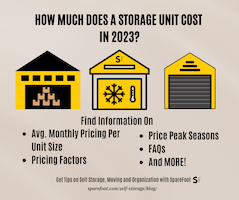You’re in the pharmaceutical or medical supply business, and you’re up to your ears in samples or inventory. What do you do? Well, self-storage units might just be the answer you’re looking for. Say you’re a pharma sales rep; a self-storage unit can be your go-to spot for keeping those samples organized. Or, if you’re running a medical supply company, these units can flexibly handle your changing stock levels.
But here’s something important to remember: Storing medical goods isn’t as simple as tossing them into any old space. The National Library of Medicine Medline Plus is pretty clear about this when talking about the need for specific security and climate control for medications. That’s something you’ve got to think about when looking for pharmaceutical storage — not only to follow the rules but also to keep all those supplies in top-notch condition.
So, what’s in it for you and your business and how can you make sure that handing down the storage of medication to pharmaceutical storage facilities is the way to go moving forward?
Top Benefits of Using Self-Storage for Pharmaceutical Storage
First off, we’re looking at cost-effectiveness. In the pharma industry, where inventory can ebb and flow like the tide, self-storage offers a wallet-friendly solution. You’re not locked into a long-term deal with a giant warehouse. Instead, you get the space you need, when you need it, without breaking the bank.
Then there’s the convenience factor. It’s more likely you’ll find a storage unit right in the neighborhood rather than a large pharmaceutical warehouse. Since it’s accessible and easy to get to, this means no long drives to distant warehouses just to grab a few samples or supplies.
Let’s not forget the rules. You definitely want to stay on the right side of regulations in this business, and that’s exactly what a good self-storage facility can provide. Beyond a convenient and scalable space, units tailored to the storage of medication provide an environment where your products stay safe, secure and effective.
Necessary Amenities for Pharmaceutical Storage Facilities
We’ve already mentioned not just any space will do for the storage of medication. But which amenities are non-negotiable and which ones are just nice to have? We’ll first cover the necessities as these criteria will help you weed out facilities that are not suitable for pharmaceutical storage.
Secure Storage
Security is non-negotiable. We’re talking about products that, if they end up in the wrong hands, could be problematic. That’s why top-notch security features like electronic gate access, 24/7 video surveillance and maybe even individually alarmed units are key. Some places even offer restricted access to certain floors, adding an extra layer of safety. The bottom line is keeping these products safe is as important as the products themselves.
Climate Control
Medications can be pretty picky. Too hot or too cold, and their effectiveness can take a nosedive. For some, even a fluctuation of only a few degrees can be problematic. That’s why you absolutely need a climate-controlled storage unit.
This isn’t just us talking; the Code of Federal Regulations mentions a “controlled” room temperature as a minimum requirement for storing prescription drugs. The temperature and humidity in this type of unit are kept constant at the level required by the meds you store so that they don’t lose their potency or become unsafe.
Indoor Storage Units
Climate-controlled units are most likely indoors, but it doesn’t hurt to double-check that with the storage facility manager. The reason you need your pharmaceutical storage space in an indoor unit is for the extra layer of security that it offers.
Additional Amenities To Consider for Pharmaceutical Storage
While the essentials are, well, essential, there are a few other amenities that, while not deal-breakers, can significantly enhance the convenience of your pharmaceutical storage.
24-Hour Access
Think about the times you might need to access your supplies. Maybe it’s early in the morning, or perhaps late at night after a long day of meetings. Pharmaceutical storage facilities with extended access hours offer that flexibility. Being able to get to your meds whenever you need them is particularly important in a sector where timing can be everything. In other words, the facility’s accessibility should match the unpredictable rhythm of your business.
Delivery Acceptance
What if your stock gets shipped directly to your storage unit, and the facility takes care of receiving it? No more rearranging your schedule to be there in person. This comes in extra handy for busy pharmaceutical reps who are constantly on the move, as that’s one less thing to worry about.
Types of Items Not Allowed in Pharmaceutical Storage Units
In pharmaceutical storage, not everything makes the cut. There are specific items that are a strict no-go in storage units and it’s important to understand these limitations to avoid any legal or safety issues.
Hazardous Materials
Hazardous materials are those that pose health risks or could be dangerous if mishandled. Many substances commonly used in manufacturing pharmaceuticals are corrosive or irritant — this means you cannot put them in a self-storage facility. The most common culprits: ethanol, sodium hydroxide, acetone, sulfuric acid and hydrochloric acid.
Controlled Substances
Narcotics and other controlled substances, ranging from potent medications to radioactive drugs, require specialized handling and storage conditions that typical storage units just can’t provide. The University of Iowa, for instance, states that “all controlled substances must be stored behind at least two differently keyed locks at all times.” Take that into account if you plan to store any controlled substances.
Check with Facility Managers
As a pharmaceutical rep, you can use self-storage for many of your needs, but you should first have a chat with the facility managers. They can best guide you on what’s allowed and what’s not, safety- and legality-wise. Remember, each storage facility might have slightly different rules, so it’s best to get the lowdown directly from the source.
Pharmaceutical Storage Decoded
Storage of medication requires strict compliance with federal and state laws and careful planning. While you deal with the latter, leave the security and safety protocols to the pros in the industry: the pharmaceutical storage facilities.
Remember, each storage decision you make has legal and ethical implications, which is why having experts weigh in is the best way to do business in this sector. Touch base with the managers at your storage facility and they will provide additional insights into the specifics of pharmaceutical storage. This way, the solution you sign up for is not just practical, but also legally sound and safe.
With the right storage of medication in place and informed by expert advice and regulatory compliance, you can focus on what you do best — providing essential medical products and services.



